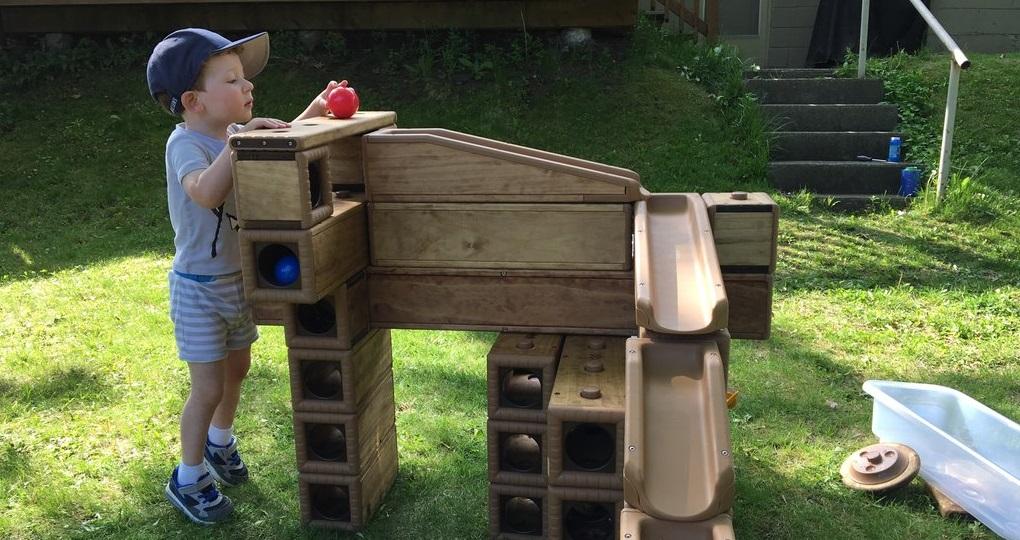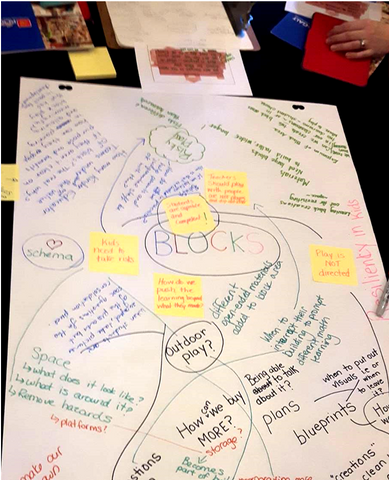Menu

At our recent block workshop in Durham, Diane and Cindy talked about block play used outdoors. Blocks are an essential part of STEM exploration, and we all know the importance of outdoor play.
When building an outdoor classroom, real world and/or natural materials like milk crates, logs, sticks and bricks etc. can invite children to experiment with large scale building.
Sticks, wood scraps or log coins were suggested by a teacher during the workshop to add to an outdoor educational environment, and immediately many of our workshop participants responded, “What about slivers?”
Another teacher mentioned that her students sanded down donated wood to ensure splinter free play, and explained how her kids delighted in the task. Others in the group worried it would be too tedious and time consuming.
The fact is some re-purposed materials, or any at all, may conflict with the care culture and values of a specific education community. That’s the Sliver Dilemma.
Natural materials have many benefits, which might (but not necessarily) include low-up front cost. The drawbacks are issues of safety and durability in that re-purposed materials, are by definition, not designed for an outdoor early year’s classroom.
Outlast outdoor blocks by Community Playthings are a response to the Sliver Dilemma. These wooden blocks, planks, crates and wheels are open ended enough for creative play, but built and finished for safety and durability.
The Community Playthings Outlast Line uses acetylated wood that is even more durable than pressure treated wood in resisting fungus and rot. Outlast blocks are created with acetylation, a nontoxic process developed in the 1930 and 1940s but only commercialized recently. The process modifies the chemical structure of wood so it won’t shrink, warp, twist, or rot.
Outlast block elements connect together with rubber buttons and indents to help build structures without a firm locking like Lego or other palm-sized construction bricks. But with Outlast Blocks’ buttons and dents children can build stable life-size play structures on uneven ground, balancing free-play while facilitating the exploration of more complicated architectures.
As with a block centre indoors or loose parts you can add natural or repurposed heuristic materials to your outdoor block play. Just be careful of anything containing reclaimed pressure treated wood – the stuff you see on most residential decks and patios. Pressure treated wood once used a potentially toxic solution of arsenic, copper and chromium in Canada until it was begun to be phased out in 2004.
Mildew is another natural process that can darken or blacken any wood. We had one school whose care-taking staff had thrown out their Outlast Blocks, because they had become mildewed in storage over the summer. But mildew is not mould. Mildew is nontoxic, and can be scrubbed off with detergent.
Acetylated wood weathers a natural gray if left untreated. If you prefer the original look, we suggest annual applications of a nontoxic penetrating oil finish. Of course, this is just for aesthetic considerations, as left unfinished, Outlast blocks and furniture will last and last, backed by a lifetime warranty.
Recently we spoke to a customer who had purchased logs as seats for their outdoor classroom. One had split which generated safety concerns. As strong and flexible as trees are when alive, cut wood is susceptible to rot, shrink, twists, warping and splitting.
Outlast also has benches, tables, chairs, sheds and wheel barrows designed to withstand these natural hazards. Exposed ends are protected with rubber. Obviously this results in a less natural look and feel but this is balanced against protection against the natural process of wood splitting.
The Community Playthings Outdoor Outlast Shed offers permanent protection and storage that neatly accommodates the crates, blocks, planks, wheels, and even a wheelbarrow. Made from the same acetylated wood, specifically designed for the elements and with pinch free hinges, the shed allows for tidying - or “a resetting of the environment” as Diane and Cindy called it at the workshop – something children can actively participate in.
Outlast employs only fast-growing, abundant FSC certified wood, and the only by-product of acetylation is acetic acid (vinegar) and water. So you can also be sure that the environment is being taken care of just as your students are.

Request your NEW 2026 Louise Kool Early Years catalogue, with new products and expanded categories!

Let us help you realize an inspiring learning environment with unmatched expertise and service.

We are here to help. From Budgeting to Room and Centre Planning we have the answers you're looking for.

If you have a questions regarding existing orders or quotes don't hesitate to contact us.
1-800-268-4011
service@louisekool.com

© 2026, Louise Kool & Galt Powered by Shopify





